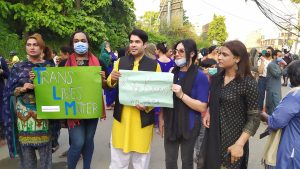In 2009, Pakistan’s Supreme Court made headlines by legally recognizing the transgender community as a distinct gender category. Subsequent laws and government announcements promised jobs, voting rights, and national identity cards. But beyond these legal milestones lies a troubling gap between recognition and real integration. For Pakistan’s estimated 500,000 transgender citizens, constitutional rights remain hollow in the face of deep-rooted societal exclusion, harassment, and institutional neglect.
During my fieldwork in Karachi, one of Pakistan’s most populous and diverse cities, I interviewed 15 transgender individuals from localities including Korangi and Defence. While the state may recognize their identity on paper, their lived realities reflect systemic abandonment. Most respondents reported never being contacted by any government agency or offered employment, despite the announcement of a 2 percent public sector job quota. Many were unaware of their rights; only a few knew they were eligible to vote or had access to healthcare benefits.
The stories they shared were harrowing. Some were disowned by their families and forced to survive on the fringe. Others, like Shehzadi, who briefly worked at the National Database and Registration Authority, were eventually let go without explanation. Almost all had experienced public humiliation, sexual harassment, or violence – often at the hands of those meant to protect them.
This marginalization is not incidental. It stems from deep-seated cultural conservatism that frames gender in rigid binary terms. In public transport, transgender individuals are unwelcome in both men’s and women’s sections. In hospitals, medical staff are often unsure whether to admit them into male or female wards – a tragic uncertainty that, in one case, reportedly led to the death of a young transgender woman, Alisha, after she was shot in Peshawar in 2016.
Pakistan’s 2018 Transgender Persons (Protection of Rights) Act was hailed as a legislative turning point. It granted the right to self-identify and promised protection from discrimination in education, employment, and healthcare. But like many well-intentioned laws in Pakistan, its implementation has been patchy at best. In the absence of accountability, transgender people continue to be treated as third-class citizens – tolerated for entertainment or ritual roles, but excluded from education, religion, housing, and formal employment.
Much of the community remains organized in traditional guru-chela structures – not by choice, but because mainstream society offers no safe spaces. Gurus, while often protective, cannot replace the systemic protections the state owes its citizens. Although organizations like the Gender Interactive Alliance have emerged as critical voices advocating for inclusion, they remain underfunded and excluded from policymaking circles.
The burden to “prove” their humanity still falls unfairly on the transgender community. This must change. It is the responsibility of the Pakistani state – and society – to dismantle the barriers of stigma and actively build inclusive systems. This includes enforcing job quotas, sensitizing public officials, reforming educational curricula to reflect gender diversity, and using media to challenge deep-seated stereotypes.
If Pakistan hopes to project itself as a progressive democracy on the world stage, it must begin by confronting the discrimination embedded within its own borders. Legal recognition is only the first step. Dignity, equality, and participation are the real measures of citizenship – and for Pakistan’s transgender community, these remain painfully out of reach.

































